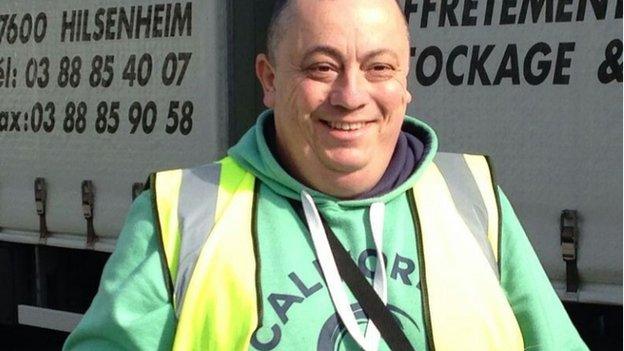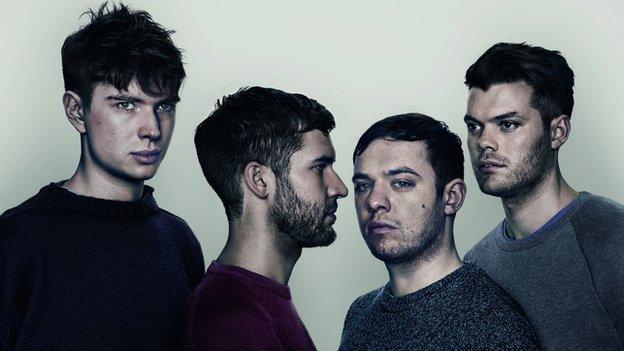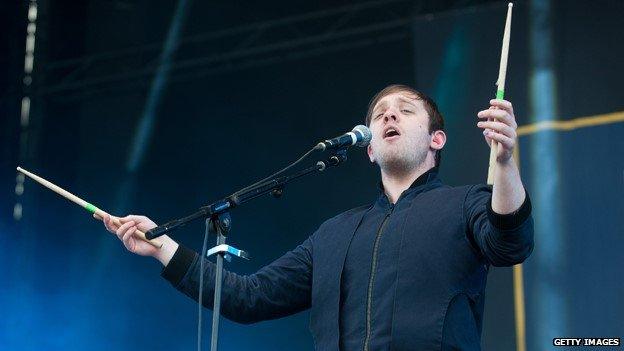Everything Everything: 'Our album is a horror bible'
- Published

Everything Everything's Jonathan Higgs (third from left): 'I knew I was in a dark place'
Ebola, missing airplanes, beheadings, the rise of UKIP.
They're not the usual topics for a top 40 chart act, but that's exactly what alt-pop band Everything Everything have been writing about over the past year.
"After we'd finished the record, I read the lyrics back and I realised I'd written a horror bible," says frontman Jonathan Higgs.
He's not exaggerating. The band's third album, Get To Heaven, is mired in violence and destruction.
"I'm going to kill a stranger, so don't you be a stranger," Higgs sings over a menacing electronic pulse on No Reptiles (he's playing a character, he's keen to stress).
The lyrics were inspired when the Manchester band took a year off from touring, and Higgs started watching rolling news on a loop.
"It all just funnelled into me day after day," he says. "It screwed me up - the violence of that year -and it came out in the music. It became impossible not to talk about it."
The story that affected him the most was that of Alan Henning - the Salford taxi driver who was delivering aid to Syria when he was kidnapped, then beheaded, by Islamic State militants.
"He was reasonably local to me. An ordinary guy. A taxi driver, for God's sake. And he went out there and he was beheaded by someone else from Britain - Jihadi John. That's what was so shocking.

David Cameron called Alan Henning's murder "barbaric and repulsive"
"It really tore me up. It upset me an awful lot. I wanted to badly to understand why this guy had gone there and cut this other guy's head off. Any way I looked at it, I couldn't make sense of it. I tried my hardest and got very embroiled in it."
Higgs' confusion and despair poured into a song called To The Blade, which opens the album.
"His bow was his anger and his blade was this cursed time," he sings as guitars splutter and strafe beneath him.
The lyrics are ugly and Higgs, who suffers from depression, admits the writing of the album affected his mental health.
"I knew I was in a dark place," he says. "I was essentially trying to inhabit the minds of the [extremists] that do this stuff and saying 'could I ever do it myself?'
"And the answer is yes, maybe I could. And that's a really horrible thing to face."
"It's very dodgy ground to even talk about," he adds, "but if you really want to solve this thing, you can't just put it in a box and hide it under the bed and drop bombs on it and hope it goes away."
'Lava of doom'
The album offers no solutions, but Higgs wants it to be a call to arms.
"Get involved. Don't ignore the things around you. Try to be a good person. It's simple stuff but I'm certain there's a lot of people who, like me, feel helpless and passive and lost in modern life.
"I'm really only saying 'do you feel like this, too? Let's talk about it.'"
To help disseminate the message, the music provides a hopeful counterpoint to Higgs' bloodthirsty lyrics.
The rave chords, syncopated bass lines and soaring guitar figures are a "Trojan horse", he explains, disguising the bubbling "lava of doom" beneath the surface.

Everything Everything won the South Bank Award for best breakthrough artist in 2010
But he lets slip that the "positive, bright" sound was a condition laid down by the rest of the band, who had grown concerned their singer's world view was unpalatable.
When they rejected a song called Pigdog on the grounds it was dripping with self-loathing, Higgs began to agree.
"The only way to contain these themes was to do it in a way that tries to escape them and rise above it," he explains.
"That's where we met each other, was these pop tunes with horror beneath."
The approach enabled the band to smuggle their message onto daytime BBC Radio 1, something the singer is quietly proud of.
"Nobody else is doing that," he grins. "And that's something we've actually been pretty successful with in the past, too.
"One of our first singles, My Kz Ur Bf, external, was essentially about an airstrike on innocent people but it was couched in a way that you couldn't really tell unless you listened to what I was saying. And most people couldn't tell because of the way I was singing."
Ah yes, that voice.
Higgs' vocals are something of an acquired taste. They flit flamboyantly between a raspy alto and the keening siren of his falsetto.
One review of the new album called it "almost unlistenable" as a result - although the vast majority of critics awarded it five star ratings.

The band play Glastonbury's Other Stage for the first time next week
The record was overseen by dance producer Stuart Price, more famous for his work with Madonna and Kylie than edgy art-pop acts like Everything Everything.
"We were very worried he was going to pop-ify us or make us bland," Higgs admits. "But he got it. He really understood where we were coming from. He never suggested a softer approach."
For all but the last 10 days of recording, Price worked at arm's length - receiving demos over the internet, making a few tweaks, and sending them back to the band.
His contribution was a "nous about radio" and "how sound works," Higgs explains.
"He can make your record sound like it's exploding out of a speaker rather than passing you by."
'Our weird, idiot selves'
But the band aren't necessarily aiming for number one singles and festival headline slots.
"We're becoming more relaxed. We're aware that the moments we've attempted to make ourselves more palatable are the moments we've had the least success."
He's talking specifically about Duet, external - a delicate, string quartet-assisted love song from their last album.
Speaking to the BBC in January 2013, Higgs called it "one of the few proper songs I've written". But a single release failed to make the Top 100 later that year.
"I thought that was going to be a huge thing for us but it really wasn't," he muses. "I don't think proper songs is where we should be going.
"The bigger things for us are when we were being our weird idiot, idiosyncratic selves.
"So that's where we are and that's where we're staying."
Get To Heaven is released on Monday, 22 June on Sony RCA.
- Published24 January 2013
